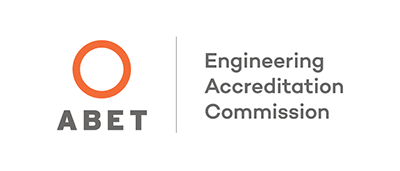- Home |
- Accreditation
Accreditation
The B.S. program in Aerospace Engineering is accredited by the Engineering Accreditation Commission of ABET, https://www.abet.org, under the General Criteria and Program Criteria for Aerospace and similarly named engineering programs.

Program Mission
The Department of Aerospace Engineering at Mississippi State University provides an accredited undergraduate curriculum with the mission of preparing students to enter the workplace as qualified entry-level aerospace engineers or to enter any aerospace engineering graduate program adequately prepared for advanced study. The mission is accomplished by a strong foundation in mathematics and physical and engineering sciences upon which student problem solving and application skills are developed. The curriculum stresses analytical and communication skills, with particular emphasis placed on engineering design throughout the curriculum. A capstone design experience in the senior year provides the opportunity to integrate design, analytical, and problem solving skills along with communication skills in a team environment that emulates aerospace engineering practice.
Program Educational Objectives
The mission is accomplished by the following educational objectives, which describe the career and professional accomplishments we are preparing our graduates to achieve. Our graduates will:
- Be involved in solving unstructured engineering problems within their organization that will allow them to successfully advance in the engineering profession;
- Be engaged in lifelong learning and pursue professional development through actions such as persistent study of the current literature in the field, participation in graduate education, professional education or continuing education opportunities, attainment of professional licensure, or membership in professional societies;
- Be professionally and ethically responsible to the profession, society, and the environment incumbent on an engineering professional;
- Collaborate successfully and positively on multi-disciplinary teams in support of their organizational goals;
- Communicate effectively in various settings and contexts by activities such as writing technical reports and peer-reviewed articles and presenting at technical interchanges.
Student Outcomes
The ASE Student Outcomes describe what students are expected to know or be able to do by the time of graduation, when each student should have:
1. an ability to identify, formulate, and solve complex engineering problems by applying principles of engineering, science, and mathematics
2. an ability to apply engineering design to produce solutions that meet specified needs with consideration of public health, safety, and welfare, as well as global, cultural, social, environmental, and economic factors
3. an ability to communicate effectively with a range of audiences
4. an ability to recognize ethical and professional responsibilities in engineering situations and make informed judgments, which must consider the impact of engineering solutions, in global, economics, environmental, and societal contexts
5. an ability to function effectively on a team whose members together provide leadership, create a collaborative environment, establish goals, plan tasks, and meet objectives
6. an ability to develop and conduct appropriate experimentation, analyze and interpret data, and use engineering judgment to draw conclusions
7. an ability to acquire and apply new knowledge as needed, using appropriate learning strategies
